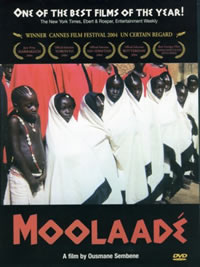Film Reviews
 Moolaadé (2004) — Senegal
Moolaadé (2004) — Senegal
Moolaadé is a brave film that challenges a barbaric tradition that's still practiced on two million girls a year, according to Amnesty International — female genital mutilation. The Senegalese writer and director Ousmane Sembene (b. 1923), known to some as the father of African cinema, situates his film in a rural Muslim village where authoritarian male elders rule by decree. A very brave woman named Collé offers moolaadé — protection or sanctuary, to four young girls who have fled the rite of "purification." She has, after all, protected her own daughter Amasatou from mutilation. Two other young girls commit suicide to avoid cutting. Collé's courageous act disrupts not only her own marriage but the entire village; and she pays a steep price. Sembene doesn't let the film end with easy answers, but the explicitly feminist message of the movie is clear: end this horrendous cultural practice. Roger Ebert called this "the best film at Cannes in 2004." Both the World Health Organization and the United Nations have called for the end of FGM. The film is in the Jula dialect and some French, with English subtitles.
Dan Clendenin: dan@journeywithjesus.net


